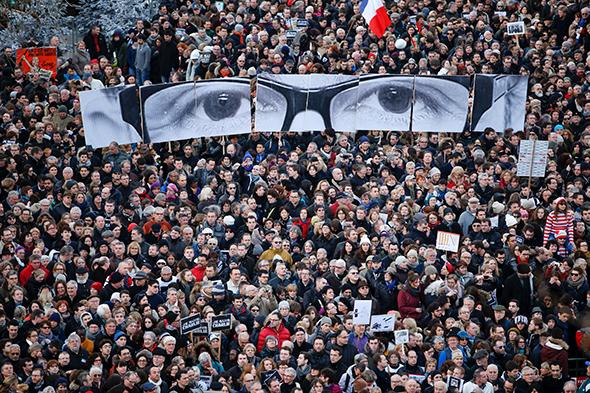In the more than two weeks that have passed since the murder of more than a dozen people in Paris—cartoonists, policemen, customers at a Jewish grocery store—a number of European countries have called for new countermeasures to fight terrorism. The French prime minister announced a whole raft of policies. The British want databases to monitor travel in and out of Europe. At emergency meetings, European officials have discussed what one British paper called a “new era of travel surveillance.”
But before any of these plans is adopted, it’s important first to ask a different question: Did the Charlie Hebdo murders really represent something new?
By asking this question I don’t mean to diminish the horror. There was something particularly grotesque about the murder of people who draw pictures for a living, and the manhunt that followed was terrifying. A Parisian friend of mine spent that day locked in her apartment, making telephone calls to her family to make sure they were all at home.
But this wasn’t the first time something like this has happened in France, or in Europe. The bombing of the London Underground in 2005 was more lethal, and the people who carried it out were better prepared than the Charlie Hebdo gunmen, who first went to the wrong address. The bombing of Madrid commuter trains in 2004 was also a coordinated, carefully planned attack. In 2012, a jihadi gunman went on a rampage, attacking policemen and Jewish children in Toulouse, prompting the French to close streets in front of Jewish schools.
Europe has survived other kinds of terrorism before, too. The Irish Republican Army killed more than 2,000 people during its 30-year campaign. In the 1960s and 1970s, the far-left Red Brigades carried out thousands of attacks, killings, and kidnappings in Italy. In the autumn of 1977, the Red Army Faction created political havoc with a terror campaign in Germany. Obviously these groups were motivated by a different sort of ideology, but they had more in common with modern jihadis than you might think. Like the current generation of terrorists, almost all received foreign aid and training, not from Syria but from Cuba, Libya, and the Soviet Union. The IRA got plastic explosives from communist Czechoslovakia. The Red Army Faction collaborated with Palestinians.
That the new wave of French terrorists are Islamists—each one, confusingly, claiming allegiance to a different branch of al-Qaida—doesn’t mean that their tactics are different. On the contrary, there is something classically anarchist, even 19th-century, about them. Think what the gunmen wanted to achieve in Paris: cause havoc, destabilize the establishment, exacerbate social divisions, bring down the system. Those aren’t very different from the aims of Gavrilo Princip, the man who shot Archduke Franz Ferdinand and launched a world war.
For that reason, the first spontaneous French response—the enormous unity marches that took place all across the country—was the best possible reaction. People who will demonstrate for their country’s values are people who will not be intimidated or divided by nihilistic violence. Although many articles have predicted a surge of support for the French far right, it is equally possible that the street marches will help President François Hollande, if only because he represents the French state. Never mind the foreign leaders who showed up (or didn’t); what matters is that the French themselves showed up, including French Muslims. In that sense, the terrorists failed, because they failed to bring down the system.
By contrast, if the French were to adopt a whole new raft of restrictions, change their foreign policy, waste huge sums of money on “homeland security,” or create pointless new institutions such as the unnecessary and time-wasting Transportation Security Administration, then the terrorists achieve some of their aims. Europeans need effective policing and counterintelligence. Perhaps they need more money or more staff, but the institutions to foster those things already exist. I recently heard a British security official recite a long list of terror plots that had been blocked. Belgian police foiled another one on Jan. 16.
Occasionally, inevitably, officials will miss one. This isn’t surprising, as the actions of extremists are, by definition, difficult to predict: The people who carry out these attacks are not only ideologues but also suicidal sociopaths. Nevertheless, the chances of being killed by a terrorist bomb remain less than the chances of being hit by a car while crossing the street.
In the end, terrorism works only if it creates terror. An overreaction is precisely what the jihadis want. We should deny that to them by resuming ordinary life as soon as possible.
